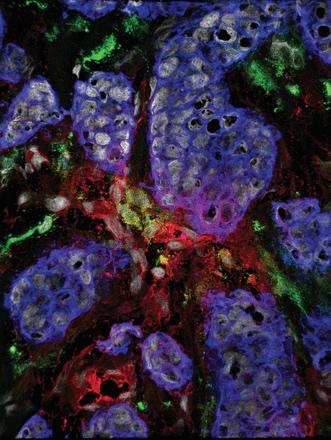New way to target advanced breast cancers

Human breast cancer tissue stained by immunofluorescence illustrates the interplay between secreted and surface-bound TGFβ (red) expressed by cancer cells (blue), which primes tumor-infiltrating myeloid cells to produce IL1β (green). This in turn will lead to chronic inflammation associated with breast cancer progression. Gray, nuclei. Credit: Jackson Laboratory
A cytokine signature found in certain kinds of breast cancer cells can not only serve as a diagnostic tool for HER2-negative cancers but also offer an effective treatment target.
A research team led by Karolina Palucka, M.D., Ph.D., a professor at The Jackson Laboratory (JAX), has collaborated with researchers at The Baylor Institute for Immunology Research to show that IL1b, a member of the interleukin 1 family of cytokines (proteins released by certain cells of the immune system) drives the inflammation often found in cancer, and appears as an “IL1 signature” in women with HER2-negative metastatic breast cancer.
“We found that IL1b orchestrates tumor-promoting inflammation in breast cancer,” Palucka says, “and its presence corresponds with poor clinical outcomes. We show that it can be effectively targeted in patients using anakinra, a naturally occurring IL1 receptor antagonist.”
Anakinra is already widely used to treat autoimmune and autoinflammatory diseases, and is being tested as an adjunct therapy to reduce the inflammation of metastatic cancer, including metastatic colorectal cancer.
In the new study, 11 women with advanced metastatic HER2-negative breast cancer received anakinra treatment, and after just two weeks showed reduced gene expression of IL1b and other cytokines and signaling pathways.
The patients then received anakinra in combination with standard chemotherapeutics for HER2-negative cancers for a median duration of four months. Some patients reported less pain and increased quality of life during this combination treatment, and three of them are still alive.
The team's report appears as the cover article in the journal Cancer Research, along with a commentary by Charles A. Dinarello, Ph.D., of the University of Colorado Denver Anschutz Medical Campus, who discovered, cloned and characterized the essential biology of a human “fever molecule,” which was later named Interleukin-1 (IL-1).
“The study represents several years of dedicated research on cancer by Palucka and colleagues,” Dinarello writes. “Although there are several advantages of knowing a transcriptional signature, including risk and prognosis, a real benefit is the exploitation of the signature to develop specific, targeted therapies. In the case of patients with cancer with IL-1 signature genes, one could simply block IL1. In fact, this is exactly what the study accomplished.”
Media Contact
More Information:
http://dx.doi.org/10.1158/0008-5472All latest news from the category: Health and Medicine
This subject area encompasses research and studies in the field of human medicine.
Among the wide-ranging list of topics covered here are anesthesiology, anatomy, surgery, human genetics, hygiene and environmental medicine, internal medicine, neurology, pharmacology, physiology, urology and dental medicine.
Newest articles

Silicon Carbide Innovation Alliance to drive industrial-scale semiconductor work
Known for its ability to withstand extreme environments and high voltages, silicon carbide (SiC) is a semiconducting material made up of silicon and carbon atoms arranged into crystals that is…

New SPECT/CT technique shows impressive biomarker identification
…offers increased access for prostate cancer patients. A novel SPECT/CT acquisition method can accurately detect radiopharmaceutical biodistribution in a convenient manner for prostate cancer patients, opening the door for more…

How 3D printers can give robots a soft touch
Soft skin coverings and touch sensors have emerged as a promising feature for robots that are both safer and more intuitive for human interaction, but they are expensive and difficult…





















